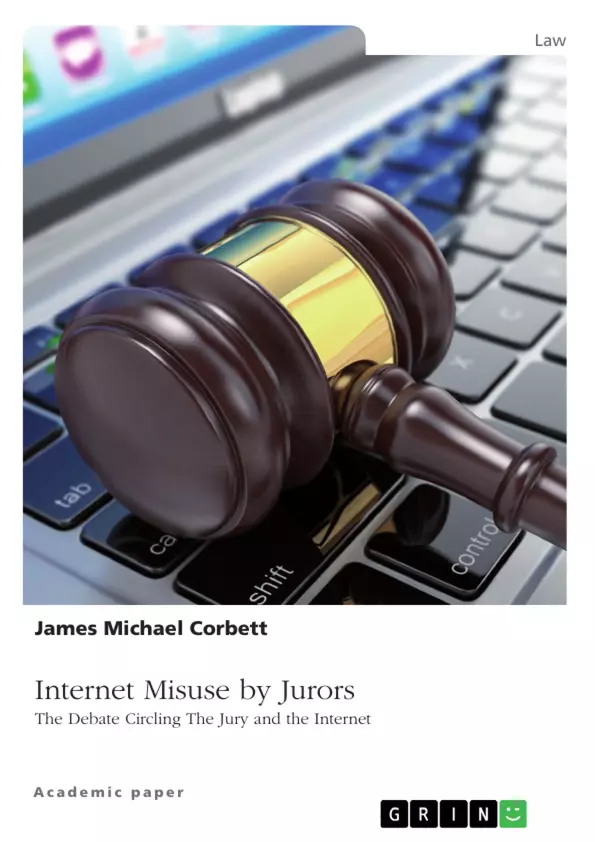The use of the internet has increased over the recent decade. It is to be expected that many people who are summoned for jury service will have some type of experience in its usage and may attempt to make reference to it. This leads to jury members searching for information about their case online. Public confidence in the jury system is waning whilst miscarriages of justice, as a result of misuse of the internet by jurors, is increasing. Recent case law has identified a variety of different types of jury impropriety and has confirmed the limitations imposed by the protection of the confidentiality of jury deliberations.
How can the misuse be stopped? What can be defined as a misuse of the internet? Do only conscious findings count or even findings by chance? How do one deal with „stumbling“ over information? James Michael Corbett gives an analysis into the problem of internet misuse committed by jurors in a court of law. From a practical point of view, he considers how serious the problem of misuse of the internet by jurors is and discusses the arguments for and/or against different approaches to overcoming the problem. Abolishing the misuse is the only way to prevent victims of having to be put through the whole process a second time because the jury may be discharged along with a new jury being empanelled.
Table of Contents
- Task
- The Debate Circling the Jury and the Internet
- Discovery of Misconduct by Accident or Declaration
- Increase in Internet Usage
- Advances in Global Technology
- The position outside the UK
- The impact of Internet Misuse
- Different approaches to overcoming Internet Misuse
- The Amendment of Legislation
- Judge directions
- The appointment of an independent J M
- Recommendations
- References
- Textbook
- Articles
- Internet Articles
- Other Sources
- Cases
Objectives and Key Themes
This article aims to explore the growing issue of internet misuse by jurors and its impact on the integrity of the jury system. It examines the current legal framework and challenges in addressing this issue. The article also proposes various approaches to overcome the problem, including juror training, court official appointment, and jury selection reforms.
- The increasing prevalence of internet misuse by jurors
- The difficulties in detecting and addressing juror misconduct
- The impact of internet misuse on the fairness and integrity of trials
- Different approaches to overcoming the problem of internet misuse
- Recommendations for improving the current situation
Chapter Summaries
- Task: This section introduces the topic of internet misuse by jurors and highlights the concerns surrounding its impact on public confidence in the jury system and potential miscarriages of justice. It outlines the objectives and scope of the article.
- The Debate Circling the Jury and the Internet: This chapter discusses the increasing use of the internet by jurors and the challenges associated with detecting and addressing internet misuse. It explores the legal framework surrounding jury deliberations and the limitations imposed by the rule of confidentiality.
- Discovery of Misconduct by Accident or Declaration: This section focuses on the different ways in which internet misuse by jurors is discovered, including accidental discoveries and declarations by jurors themselves. It examines several case studies illustrating how such misconduct comes to light.
- Increase in Internet Usage: This chapter presents research findings on the prevalence of internet usage by jurors, highlighting the growing trend of jurors seeking information about trials online. It explores the implications of this behavior and the potential increase in internet misuse.
Keywords
The primary keywords and focus topics of this article include: internet misuse, jury system, juror misconduct, trial integrity, legal framework, confidentiality, jury deliberations, case studies, research findings, judicial reforms, recommendations, training, monitoring, selection procedures.
Frequently Asked Questions
What is considered internet misuse by jurors?
Internet misuse occurs when jurors search for information about their case online, look up defendants, or use social media to discuss deliberations, rather than relying solely on evidence presented in court.
Why is juror internet usage a threat to the justice system?
It can lead to miscarriages of justice, cause juries to be discharged, and undermine public confidence in the fairness and integrity of the trial process.
How is juror misconduct typically discovered?
Misconduct is often discovered by accident, through reports from other jurors, or by voluntary declarations from the jurors themselves during or after the trial.
Does the rule of confidentiality protect jury deliberations?
Yes, the legal framework traditionally protects the confidentiality of jury deliberations, which can make it difficult to identify and prove instances of internet misuse.
What are some proposed solutions to stop this misuse?
Proposed approaches include specific judge directions, juror training, the appointment of independent monitors, and potential amendments to legislation regarding jury service.
What is the impact of global technology on trials?
Advances in global technology and the ubiquity of smartphones have made it easier for jurors to "stumble" over information or consciously seek out prohibited details about a case.
- Arbeit zitieren
- James Michael Corbett (Autor:in), 2012, Internet Misuse by Jurors. The Debate Circling The Jury and the Internet, München, GRIN Verlag, https://www.grin.com/document/924886



